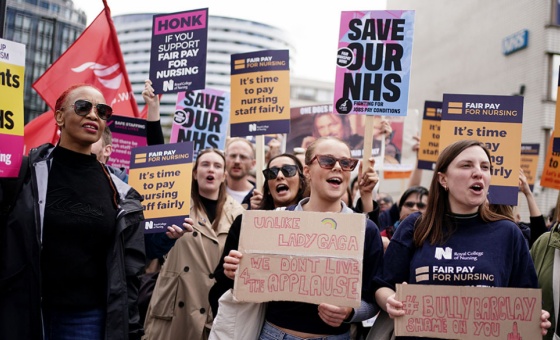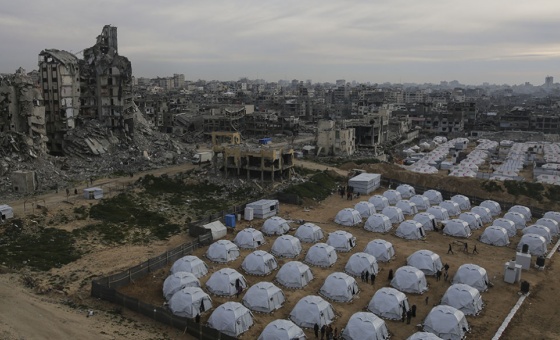This is the last article you can read this month
You can read more article this month
You can read more articles this month
Sorry your limit is up for this month
Reset on:
Please help support the Morning Star by subscribing here
On Sunday night, the news progressives all around the world feared finally came in from Brazil. Jair Bolsonaro, an extreme far-right politician, was announced as the next president.
Some have dubbed Bolsonaro “the Trump of Latin America” and he will certainly be working closely with the US president to reshape Latin America, but, as a firm opponent of Trump’s worldview and politics, I think we have to be clear that Bolsonaro is even worse than that.
Bolsonaro is a far-right politician who served as a military officer under Brazil‘s murderous dictatorship — a dictatorship he openly applauds. He has a record of publicly calling for extreme violence by the military against progressives.
Bolsonaro’s view on the brutal fascist dictatorship of General Pinochet in Chile, which was the first herald of a global era of neoliberalism and was kept in place at the barrel of a gun, is uncompromising and illustrative. He said that “Pinochet should have killed more people.” Pinochet was, of course, responsible for the deaths of thousands of people.
He has bemoaned the fact that, in his view, the dictatorship in Brazil wasn’t murderous enough. saying it “should have killed 30,000 more.” He believes “the situation of the country would be better today if the dictatorship had killed more people” and said that “the big mistake was to torture and not kill.” He has stated with no equivocation: “I’m favourable to torture and you know it.”
And in the very presidential election campaign that has just concluded with his election, he declared: “Let’s shoot all the PT [Workers’ Party] members.”
Such remarks cannot be laughed off anywhere, but especially not in the Brazilian context where violence in the run-up to the presidential election, black Brazilian human rights activist and left-wing councillor Marielle Franco was assassinated.
People should be under no illusion. What is under way is an attack on the working class in Brazil in all its diversity. Bolsonaro’s reactionary sexist, homophobic and racist views are expressed with force and without reservation. His apparent readiness to open up the Amazon to greater exploitation is a threat to humanity at a time of climate breakdown.
Brazil is a fragile and relatively new democracy. It was only in 1989 that it held its first elections for president by direct popular ballot since the 1964 coup. Bolsonaro threatens the gains made in the subsequent period and has made no secret of his contempt for democracy. He is on record as saying: “Through the vote you will not change anything in this country, right? Nothing! Absolutely nothing! You will only change, unfortunately, on the day when we begin a civil war here.”
It is a measure of the wide global concern at this deeply dangerous development in Brazil that before Bolsonaro’s election, an International Declaration Against Fascism in Brazil was signed by politicians, including Bernie Sanders, former prime minister of Spain Felipe Gonazalez, former prime minister of France Dominique de Villepin, former president of France Francois Hollande and former president of Uruguay Jose Pepe Mujica.
As the Brazil-based journalist Glenn Greenwald said, Bolsonaro “explicitly reveres and wants to replicate the worst elements of the military dictatorship … that’s definitely his intention.”
The future of Brazil is not predetermined and we must all play our role. Understanding what led to this situation is key. Crass analysis of a “left-behind working class” being the base for Bolsonaro should play no role in those seeking to understand events there.
The far right won 97 per cent of Brazil’s 1,000 wealthiest municipalities. The left won 98 per cent of the poorest. Just as with Trump, it is clear whose victory this is and it is clear to whom Bolsonaro owes his allegiance.
There is likely to be considerable opposition to Bolsonaro in Brazil. His victory only came about because the far more popular socialist opponent Lula languishes in jail on trumped-up charges, barred from standing in the election despite the United Nations declaring Brazilians should be allowed to vote for him should they wish. If Lula had been allowed to stand, polls show he would have won.
Lula, the country’s first working class president, is not the only Workers Party leader to be removed by what many are terming “lawfare.” Dilma Rousseff, Brazil’s first female president, was controversially removed from office in 2016 by undemocratic means.
Lula and Dilma were both energetic opponents of the brutal Brazilian dictatorship. Dilma, whom I was fortunate to meet earlier this year, was tortured by it. The attempt to remove them from the political scene by the intrigue of lawfare has paved the way for a supporter of the dictatorship they struggled against to rise to power.
As Lula has explained, “My imprisonment was the latest phase in a slow-motion coup designed to permanently marginalise progressive forces in Brazil. It is intended to prevent the Workers’ Party from again being elected to the presidency".
This was the way in which the left Workers Party was sidelined. The centre-right PMDB establishment party damaged itself by pursuing deep austerity economics. Its president Michel Temer, who replaced the unfairly ousted Rousseff, saw his polling plummet to single figures. This was the vacuum into which far-right Bolsonaro stepped.
Bolsonaro’s election is the result of an anti-democratic, anti-socialist process, but his election may not be the final chapter.
Solidarity with the working class as whole, with its black and minority communities, women, LGBT people and NGOs and trade unionists of Brazil may have to become the great internationalist cause of our era for our movement.
That’s why I am proud to be helping launch the new Brazil Solidarity Initiative to stand shoulder-to-shoulder in solidarity with the millions of Brazilians fighting for democracy, human rights and social progress in Brazil.
We must fulfil our internationalist duty, as our movement did during the Pinochet dictatorship in Chile. International solidarity will be key to providing practical and political support for Brazil but also to prevent Bolsonaro’s example spreading throughout the region and around the world.










